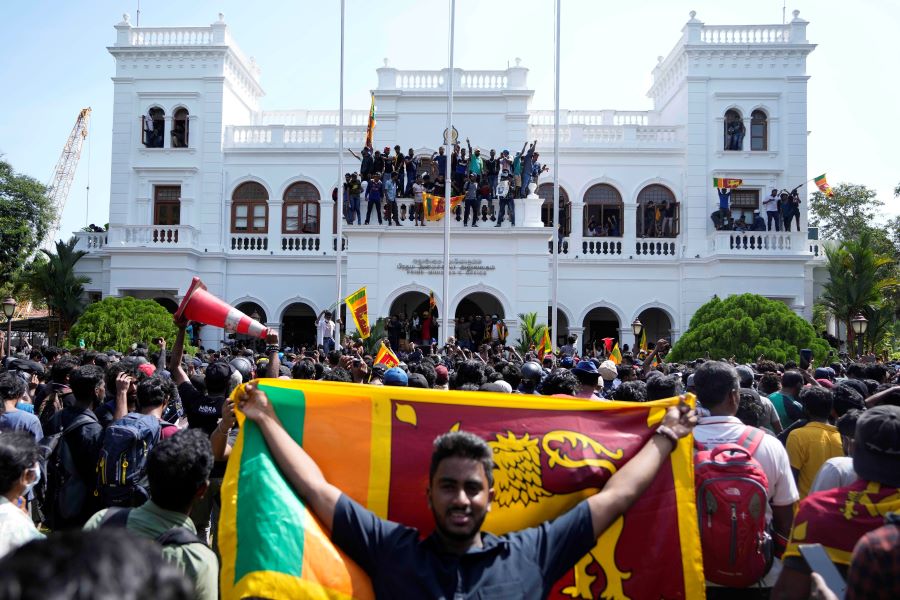
by Feizal Samath | 15 Jul 2022 | Asia, Economy, Educators' Catalog, Eyewitness, Future of Democracy, Human Rights, Personal Reflections, Politics
My family can barely make ends meet amid runaway inflation and shortages of foodstuffs. No wonder Sri Lanka has kicked out a corrupt ruling clan. Protesters take over the office of Sri Lankan Prime Minister Ranil Wickremesinghe, demanding he resign, Colombo, Sri...
News Decoder correspondent Feizal Samath provides an on-the-ground glimpse of life in Sri Lanka following months of inflation, essential shortages and protests that led to the ouster of the president and the ruling clan. Samath gives context to a situation that many outside of the region ignored until images of protestors storming the presidential palace flooded the media. By painting a picture of his own challenges in procuring fuel and everyday foods, Samath puts readers in the shoes of those whose lives have been disrupted by turmoil.
Exercise: Ask students to imagine a part of the world different from their own and write a first-person narrative of what life looks like for a teenager there. How do the political and economic realities impact their family, their schools or their daily routines?

by Susan Ruel | 13 Jul 2022 | Conflict, Educators' Catalog, Eyewitness, Media Literacy, Personal Reflections
Marie Colvin started as a journalist writing for a New York trade union. She ended up a war correspondent who changed people’s lives. Medical staff examine Marie Colvin in Colombo’s eye hospital in Sri Lanka, 17 April 2001. (AP Photo/Gemunu Amarasinghe) A...
Susan Ruel reflects on the life and career of Marie Colvin, an accomplished foreign correspondent killed in Syria in 2012. Colvin reported on major conflicts in Europe, the Middle East, Africa and Asia, believing someone has to go there and see what is happening. “She always told the stories of the ordinary men and women who bore the consequences of the power struggles and wars waged by political leaders,” Committee to Protect Journalists Executive Director Robert Mahoney said. With more journalists murdered or missing this year than in nearly all of 2021, the rights of journalists in war zones cannot be taken for granted.
Exercise: Ask students to discuss how media coverage of war and conflict zones has evolved and what they think accounts for the increased threat against journalists.
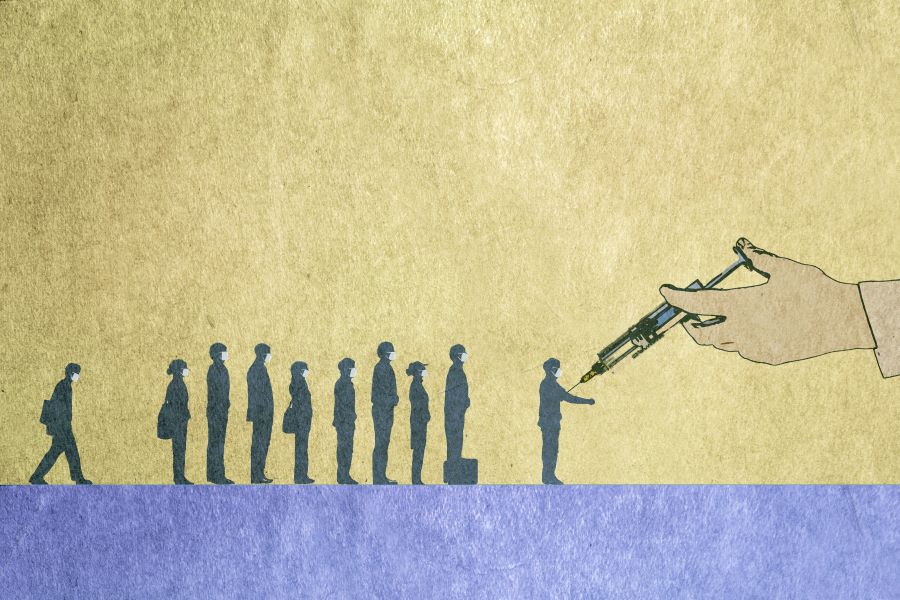
by Maggie Fox | 5 Jul 2022 | Educators' Catalog, Health and Wellness
Most nations have rolled back steps to contain COVID-19. But the virus continues to kill. Many experts are frustrated governments are not doing more. Immunization, conceptual illustration (Photo by: SCIENCE PHOTO LIBRARY via AP Images) Airlines have stopped requiring...
COVID fatigue is worldwide even though the virus continues to spread. In many places, restrictions have been lifted for masks, travel and testing. Vaccination targets remain largely out of reach. Since the onset of the pandemic, health experts and governments have been at odds about the best approach to beat the virus. Our inability to curb the spread of the virus begs broader questions, including whether we are up to the task of combating climate warming. How could we have better balanced health and the economy, collective responsibility and individual rights to overcome COVID sooner?
Exercise: Ask students to debate the role of government versus individual responsibility in combating global crises such as COVID and climate change.
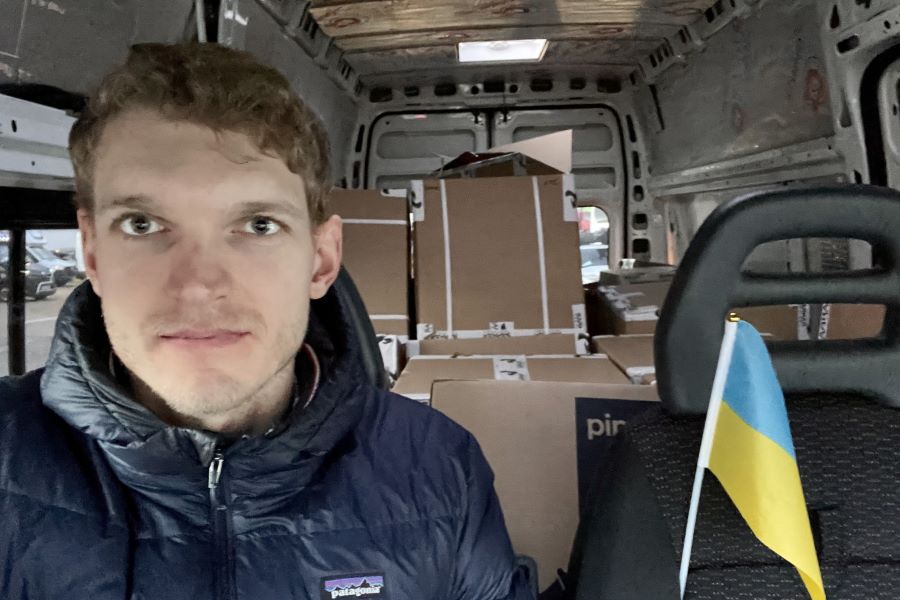
by Jeffrey Mo | 20 Jun 2022 | Conflict, Educators' Catalog, Ukraine, University of Toronto Journalism Fellows
Dmytro Shelukhin is a Ukrainian working for a UK investment bank. But like many émigrés, he is finding meaning helping his home nation fight Russia. Dmytro Shelukhin on the way to Ukraine with war materiel (photo courtesy of Dmytro Shelukhin) For the past eight years,...
Like many big global news stories, the war in Ukraine has released a tsunami of ink, making it difficult for journalists to find a fresh angle. Jeffrey Mo, a fellow at the University of Toronto, manages to break new ground with a simple story about a Ukrainian émigré who sends war matériel to armed forces in his embattled home country. Mo lets Dmytro Shelukhin, a Ukrainian working for a UK investment bank, be the protagonist of the story, which discreetly underscores both the high stakes involved in the conflict and the depth of Ukrainian defiance.
Exercise: Ask your students to identify an issue dominating the news around the world – such as climate change or human rights – and to find a local angle. Then they should interview someone directly involved in the local matter and write a story capturing that person’s experiences and thoughts.

by Nina Bugajska | 2 Jun 2022 | Economy, Educators' Catalog, Human Rights, Immigration, Realgymnasium Rämibühl Zürich, Refugees, Student Posts, Youth Voices
Immigrants around the world often face discrimination. But they can help drive economic growth and in my country are among the best educated. Protesters in Zurich demonstrate against an initiative that would limit the number of migrant workers in Switzerland, 9...
Many students have strong convictions about issues, so strong that their perspective can be clouded. So we encourage students to base their reporting on solid data and authoritative sources. In her story about immigrants in Switzerland, Nina Bugajska of Realgymnasium Rämibühl in Zurich cites a global polling company, a German data specialist, the Swiss federal statistics office and a Swiss consulting company, and she interviews a university professor, giving her a solid foundation for her look into the important role that immigrants play in Switzerland’s economy. Immigration is a topic that is easily manipulated by political demagogues, making Bugajska’s story a valuable contribution to clear thinking.
Exercise: Ask your students to choose a controversial topic and then find authoritative data, relevant to the issue, that is collected by official authorities, academics or private companies. They should then summarize what the data says about the issue.

by Chloe Patricof and Anabella Paige | 5 May 2022 | Educators' Catalog, Fake News, Hewitt, Media Literacy, Podcasts, Student Posts, Youth Voices
The world is awash in misinformation. But can we rein it in without eroding free speech? Our podcast explores this thorny issue facing our societies. News Decoder · Let's Talk About It We are all flooded with misinformation. But what can we do about it? We turned...
Many young people find it difficult to write. They can struggle to convey their thoughts and can get bogged down in convoluted sentences. Our recommendation is to write as though you are explaining an issue to your family over dinner – to keep it simple. That’s one reason a podcast can offer a more natural way to examine an issue, even one as thorny as free speech. In their engaging podcast, Chloe Patricof and Anabella Paige of The Hewitt School speak naturally about a tough topic – misinformation – and turn to the managing editor of a U.S. media company to explore whether government regulation is an answer. Such a conversation can be an alluring way to delve into a knotty issue.
Exercise: Have your students pair up and record a conversation about a polarizing issue in their community, making sure to try to convey the views of all legitimate sides.
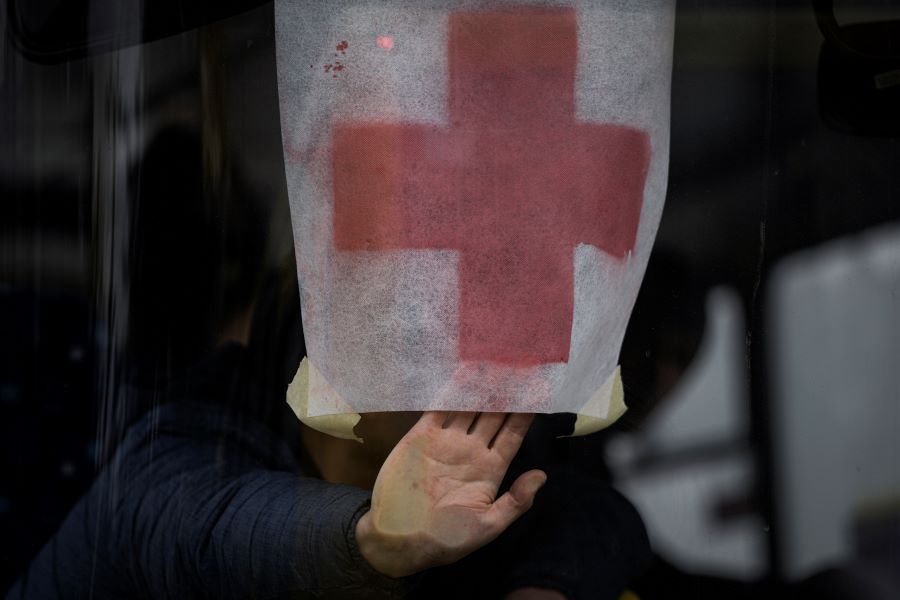
by Katharine Lake Berz and Daneese Rao | 28 Apr 2022 | Conflict, Educators' Catalog, Human Rights, Refugees, Ukraine, University of Toronto Journalism Fellows
For more than 150 years, the Red Cross has remained neutral in wars. Today, it still defends that stance against critics as Russia ravages Ukraine. A man presses paper with a red cross on it against the windshield of a bus as civilians are evacuated from Irpin, on the...
For many people, the war in Ukraine seems one of the latest litmus tests of ideological purity: One side is good, the other side bad. So it is with politics in many countries: One side is right, the other wrong. Nowadays it can be difficult, especially for youth, to understand why diplomats speak to all sides in an armed conflict, or why the Red Cross would remain neutral in Ukraine. In their story, Katharine Lake Berz and Daneese Rao, fellows at the University of Toronto, examine why the 159-year-old Red Cross, true to tradition, has refused to condemn Russia’s invasion so it can offer aid to victims on all sides of the conflict. It’s a valuable lesson for a world hungry for harmony.
Exercise: Have your students debate this resolution: “The Red Cross should condemn Russia over its invasion of Ukraine.”

by Monica Kidd | 22 Apr 2022 | Climate change, Decoders, Economy, Educators' Catalog, Environment, Eyewitness, University of Toronto Journalism Fellows
I am interested in carbon credits — permits that offset greenhouse emissions. So I bought a tonne of carbon. Here’s what I learned. (Photo courtesy of Cory Willis of Willis Farms, Inc. in Tennessee, United States) Anyone with a credit card and the inclination...
Climate change is an existential challenge that resonates particularly strongly with young people, but much of the debate around how to limit global warming to 2 degrees Celsius remains abstract. Carbon credits are considered part of the solution, but just what is a carbon credit? Monica Kidd, a Global Journalism Fellow at the University of Toronto Dalla Lana School of Public Health, asked herself that same question, but instead of simply consulting a text book, she went out and bought a tonne of carbon for $15 and then listened to the farmer who made the sale explain how it works and why carbon credits are not a silver bullet in the climate fight. Understanding the complexities of problems is the sine qua non to pinpointing solutions.
Exercise: Break students into groups and ask each group to buy a tonne of carbon and then explain how they have contributed to the fight against global warming and why it is not enough.
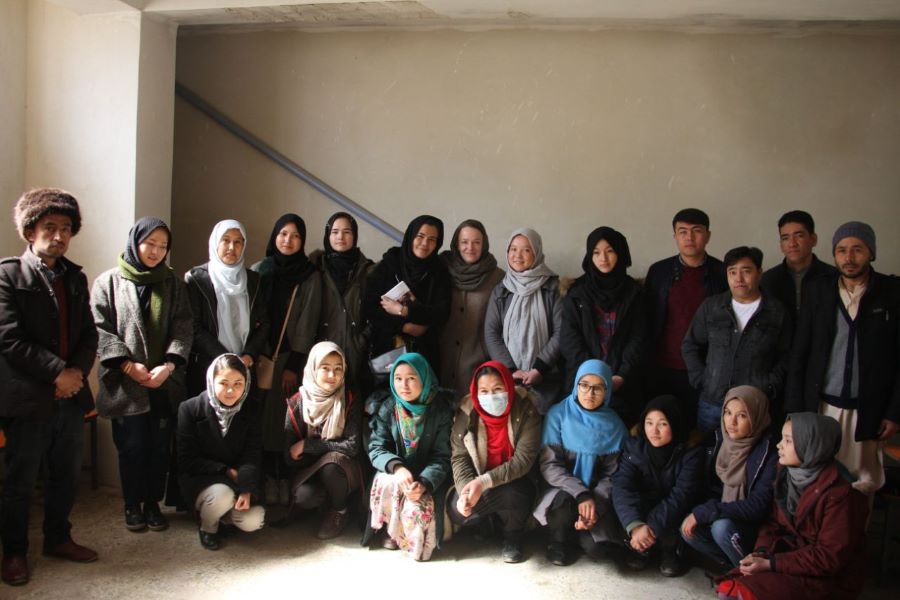
by Jalal Nazari | 20 Apr 2022 | Asia, Conflict, Educators' Catalog, Islam, Terrorism, University of Toronto Journalism Fellows, Women's rights
The Taliban have barred girls from schools in Afghanistan. So some of them gather secretly in homes in Kabul, drawn together by a former teacher. Hassan Adib leads a discussion of “Memories of a translator” by Mohhamad Qazi in Kabul, April 2022. (Photo by...
The Taliban’s takeover of Afghanistan means millions of girls cannot attend school. Many young people outside of the country know this, but it is difficult for them to conceive just what this means for a young Afghan girl their age. In his story, Jalal Nazari, an Afghan now living in Canada where he is a Global Journalism Fellow at the University of Toronto Dalla Lana School of Public Health, takes us inside Kabul homes, where about 30 teenage girls meet secretly twice a month to improve their reading and writing skills. To hear the girls and their teacher speak adds a highly personal dimension to a conflict that for many young people remains distant and abstract. The courage they show in the face of Taliban strictures is a reminder to young people everywhere that education is a privilege not to be taken lightly.
Exercise: Ask your students to interview their parents, asking them why education is important, and then to write an essay quoting their parents and adding their own thoughts.

by Octavian-Anton Ghisa | 14 Apr 2022 | Conflict, Contest winners, Educators' Catalog, Human Rights, Immigration, Student Posts, Transylvania College, Ukraine, Youth Voices
Russia’s invasion of Ukraine has sent millions of refugees into neighboring nations. I live in Romania, where the war has stirred compassion and fear. A Ukrainian refugee on a bus at the Romanian-Ukrainian border in Siret, Romania, 8 March 2022 (AP Photo/Andreea...
War in Europe has awakened an entire generation in the West to the horrible realities of armed conflict. Octavian-Anton Ghisa lives in Romania, which borders Ukraine, and so he naturally takes a keen interest in the hundreds of thousands of refugees who have poured over the border since Russia invaded Ukraine. Ghisa, a student at Transylvania College, combines that interest with a knack for listening to others and produces a piece that captures a powerful mix of emotions: “fear, stress, compassion, panic and even ambivalence.” Listening carefully is a skill that does not come naturally to many young people but which underpins any solid reporting.
Exercise: Ask each student to interview a parent about a difficult moment in their youth and to write a short article based on quotes from the interview.










